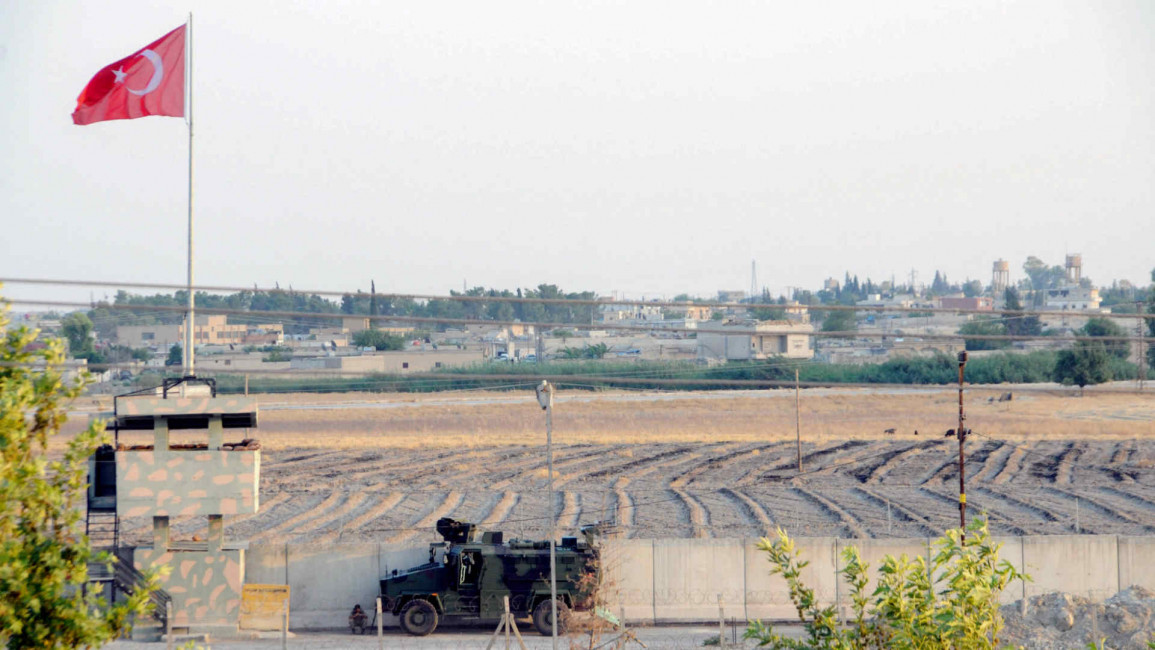Feared Turkish operation in Syria would lead to full US withdrawal, officials say
Feared Turkish operation in Syria would lead to full US withdrawal, officials say
US officials fear a Turkish military operation in northeastern Syria is imminent, and have said that such an operation would lead to the full withdrawal of US troops.
2 min read
US officials see 'mounting evidence' of a coming Turkish invasion [AFP]
There is "mounting evidence" Turkey is preparing to launch a unilateral military operation in northeastern Syria, US officials have warned.
Ankara and Washington agreed in August to establish a so-called "safe zone" in northeastern Syria, a long hoped-for move in Turkey.
The safe zone, the length and depth of which has not yet been decided, will act as a buffer between the Turkish borders and Syrian Kurdish forces who Ankara designates as a terrorist group.
While US, Turkish and Kurdish forces have begun operations towards realising the zone on either side of the border, Ankara has repeatedly threatened to unilaterally launch a military operation to see the plan through if its wishes are not realised soon enough.
President Recep Tayyip Erdogan has said Turkey will build a buffer zone some 30 kilometres or more deep, where it will construct new homes for up to 3 million Syrian refugees currently resident in Turkey.
The Syrian Kurdish administration has warned that a unilateral Turkish operation could see their US-backed forces decimated. The Kurdish forces have also warned that Turkey's plan to repopulate the zone with refugees from elsewhere in Syria will be viewed as demographic engineering.
US officials now see "mounting evidence" Turkey is planning to launch such an operation.
"It seems more and more likely based on the actions they are taking in southern Turkey," said one US official, citing movement of equipment and personnel in the border region.
A full-scale Turkish invasion of northeastern Syria would force Washington to pull out its remaining troops in the area, which number more than 1,000, officials told The Wall Street Journal.
Trump last year promised a full withdrawal of US troops from the war-torn country, a move which garnered widespread condemnation from military officials.
The troops' withdrawal would prompt the massacre of Syrian Kurdish forces and possibly civilians in a Turkish invasion, Kurdish forces argued.
While Trump ultimately decided upon cutting back the number of soldiers in Syria rather than withdrawing them entirely, US officials say a full-scale Turkish invasion would force a full withdrawal in order to avoid conflict with a NATO ally.
"The US does not have enough forces in Syria to prevent the Turks from crossing the border and will not fight Turkey, a NATO ally, if that occurs," Jennifer Cafarella, a Syria analyst at the Washington-based Institute for the Study of War, told WSJ.
Turkey has twice launched unilateral military operations in Syria against the Kurdish forces and the Islamic State group.
Ankara and Washington agreed in August to establish a so-called "safe zone" in northeastern Syria, a long hoped-for move in Turkey.
The safe zone, the length and depth of which has not yet been decided, will act as a buffer between the Turkish borders and Syrian Kurdish forces who Ankara designates as a terrorist group.
While US, Turkish and Kurdish forces have begun operations towards realising the zone on either side of the border, Ankara has repeatedly threatened to unilaterally launch a military operation to see the plan through if its wishes are not realised soon enough.
President Recep Tayyip Erdogan has said Turkey will build a buffer zone some 30 kilometres or more deep, where it will construct new homes for up to 3 million Syrian refugees currently resident in Turkey.
The Syrian Kurdish administration has warned that a unilateral Turkish operation could see their US-backed forces decimated. The Kurdish forces have also warned that Turkey's plan to repopulate the zone with refugees from elsewhere in Syria will be viewed as demographic engineering.
US officials now see "mounting evidence" Turkey is planning to launch such an operation.
"It seems more and more likely based on the actions they are taking in southern Turkey," said one US official, citing movement of equipment and personnel in the border region.
A full-scale Turkish invasion of northeastern Syria would force Washington to pull out its remaining troops in the area, which number more than 1,000, officials told The Wall Street Journal.
Trump last year promised a full withdrawal of US troops from the war-torn country, a move which garnered widespread condemnation from military officials.
The troops' withdrawal would prompt the massacre of Syrian Kurdish forces and possibly civilians in a Turkish invasion, Kurdish forces argued.
While Trump ultimately decided upon cutting back the number of soldiers in Syria rather than withdrawing them entirely, US officials say a full-scale Turkish invasion would force a full withdrawal in order to avoid conflict with a NATO ally.
"The US does not have enough forces in Syria to prevent the Turks from crossing the border and will not fight Turkey, a NATO ally, if that occurs," Jennifer Cafarella, a Syria analyst at the Washington-based Institute for the Study of War, told WSJ.
Turkey has twice launched unilateral military operations in Syria against the Kurdish forces and the Islamic State group.



